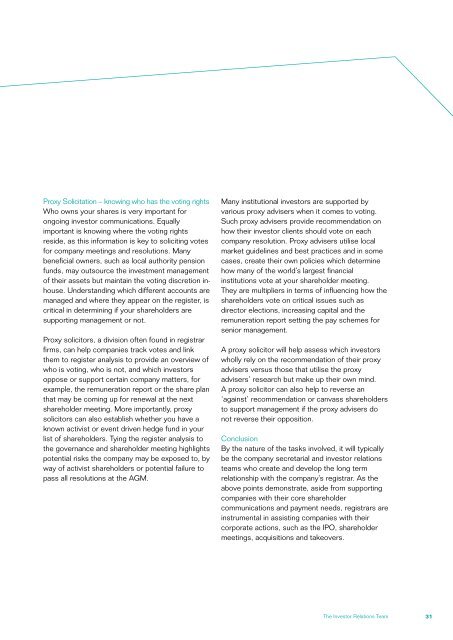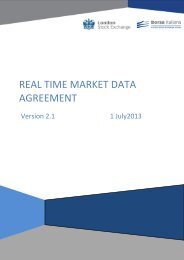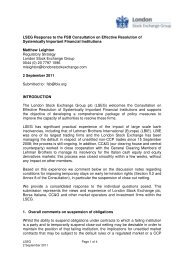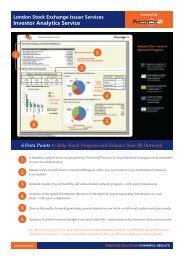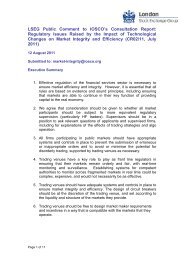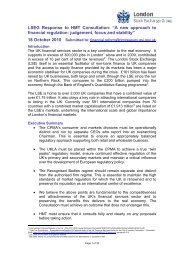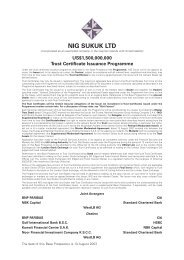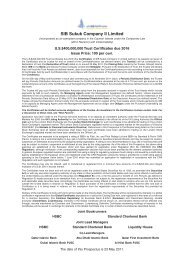Investor Relations - A Practical Guide - Investis
Investor Relations - A Practical Guide - Investis
Investor Relations - A Practical Guide - Investis
You also want an ePaper? Increase the reach of your titles
YUMPU automatically turns print PDFs into web optimized ePapers that Google loves.
Proxy Solicitation – knowing who has the voting rights<br />
Who owns your shares is very important for<br />
ongoing investor communications. Equally<br />
important is knowing where the voting rights<br />
reside, as this information is key to soliciting votes<br />
for company meetings and resolutions. Many<br />
beneficial owners, such as local authority pension<br />
funds, may outsource the investment management<br />
of their assets but maintain the voting discretion inhouse.<br />
Understanding which different accounts are<br />
managed and where they appear on the register, is<br />
critical in determining if your shareholders are<br />
supporting management or not.<br />
Proxy solicitors, a division often found in registrar<br />
firms, can help companies track votes and link<br />
them to register analysis to provide an overview of<br />
who is voting, who is not, and which investors<br />
oppose or support certain company matters, for<br />
example, the remuneration report or the share plan<br />
that may be coming up for renewal at the next<br />
shareholder meeting. More importantly, proxy<br />
solicitors can also establish whether you have a<br />
known activist or event driven hedge fund in your<br />
list of shareholders. Tying the register analysis to<br />
the governance and shareholder meeting highlights<br />
potential risks the company may be exposed to, by<br />
way of activist shareholders or potential failure to<br />
pass all resolutions at the AGM.<br />
Many institutional investors are supported by<br />
various proxy advisers when it comes to voting.<br />
Such proxy advisers provide recommendation on<br />
how their investor clients should vote on each<br />
company resolution. Proxy advisers utilise local<br />
market guidelines and best practices and in some<br />
cases, create their own policies which determine<br />
how many of the world’s largest financial<br />
institutions vote at your shareholder meeting.<br />
They are multipliers in terms of influencing how the<br />
shareholders vote on critical issues such as<br />
director elections, increasing capital and the<br />
remuneration report setting the pay schemes for<br />
senior management.<br />
A proxy solicitor will help assess which investors<br />
wholly rely on the recommendation of their proxy<br />
advisers versus those that utilise the proxy<br />
advisers’ research but make up their own mind.<br />
A proxy solicitor can also help to reverse an<br />
‘against’ recommendation or canvass shareholders<br />
to support management if the proxy advisers do<br />
not reverse their opposition.<br />
Conclusion<br />
By the nature of the tasks involved, it will typically<br />
be the company secretarial and investor relations<br />
teams who create and develop the long term<br />
relationship with the company’s registrar. As the<br />
above points demonstrate, aside from supporting<br />
companies with their core shareholder<br />
communications and payment needs, registrars are<br />
instrumental in assisting companies with their<br />
corporate actions, such as the IPO, shareholder<br />
meetings, acquisitions and takeovers.<br />
The <strong>Investor</strong> <strong>Relations</strong> Team 31


